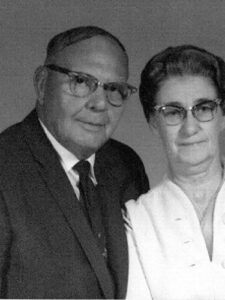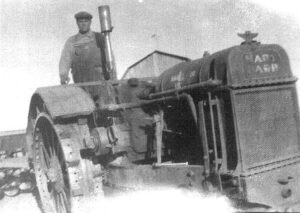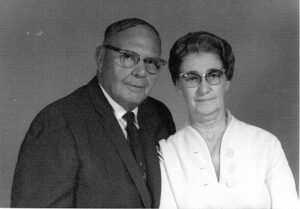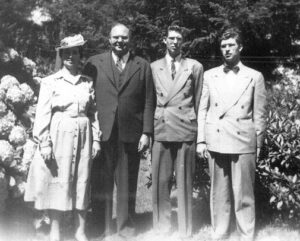F.M. Sumpter - Holiness Heroes

Frederick Marion Sumpter
February 18, 1901 – March 22, 1982
One of the evidences of a life lived well is that many can point to that man as the one who made a difference in their life. Rev. Sumpter was such a man. Many counted it a privilege to have been touched by his ministry. In later years Marion and Lucille would receive many cards, letters, flowers, gifts, visits ….. testimonies to the love felt for them by a host of people.
Near the turn of the century, Marion’s father, Francis Marion Sumpter, heard of land claims to be had in western Oklahoma. He traveled (possibly by train) to the May, Oklahoma area. There he found just what he wanted…eighty acres of farmland. In an effort to discourage him, two men told him that it had not rained there in ten years. Mr. Sumpter remarked, “No rain, and grass grows just like this! It’s just what I want!”
 He contested the two men, got his claim, and headed back to Fort Scott, Kansas to get his family, animals, equipment and household goods. A train box-car carried his possessions to the Oklahoma panhandle. The land was open country. Upon arrival they dug a half- dugout and built rooms above it. That was their home until later when a two-room “soddie” was constructed. They put out fruit trees, put in gardens, and raised live-stock to provide for their needs. In 1914 , Francis built a big eight room house which was later moved into Laverne, Oklahoma.
He contested the two men, got his claim, and headed back to Fort Scott, Kansas to get his family, animals, equipment and household goods. A train box-car carried his possessions to the Oklahoma panhandle. The land was open country. Upon arrival they dug a half- dugout and built rooms above it. That was their home until later when a two-room “soddie” was constructed. They put out fruit trees, put in gardens, and raised live-stock to provide for their needs. In 1914 , Francis built a big eight room house which was later moved into Laverne, Oklahoma.
It was in this area that Frederick Marion Sumpter spent his childhood and youth. He was born on February 18,1901 to Francis Marion Sumpter and Ida (Pattison) Sumpter at Fort Scott, Kansas. Francis and Ida had both lost their spouses. They married and raised eight children. Ida’s offspring were Vere and Ina. They were soon joined by siblings, Paul, Silas, Esther, Marion, Leon, and David. Marion was three weeks old when he made the journey to live in Oklahoma.
When he was old enough, he began to attend the local country school (with all eight grades in one room). During the eight years that he attended school, Marion was only able to complete three full years. His father took him out of school every year to help with farm work. One year as a teenager, he missed much of a school-year due to rheumatic fever. He came away from that episode with heart damage and spent a good portion of his life bothered by arthritis.
The family attended church at May, Oklahoma. Marion prayed through at age 16, but later backslid. He was interested in many things and learned mechanical skills while working on farm machinery. He wanted to be an electrician and took a home-study course in electrical engineering. Rising very early in the morning he studied before time to do the farm chores. Before he was able to complete the course of study, he felt that the Holy Spirit told him that he would be a preacher and would not need to finish.

Marion met Theoria Lucille Carnegey and they married at Woodward, Oklahoma on Nov. 10, 1926. To this union was born, Matthew Edward in Sept. 1928 and Everett Wayne on Nov. 9, 1930. The family would pile into an old Ford car when it was time to go to church. Their starched and ironed clothing would have many wrinkles when they arrived. One spring, Bro I.L. Patton came to hold a revival. Lucille was under deep conviction. Marion took her to the altar. Later…during a summer camp meeting, Marion repented of his sins and found peace. He later was entirely sanctified.
Marion and his younger brother, Leon were wheat farmers. They had purchased $10,000 worth of farm machinery and had 1,000 acres of wheat planted. At harvest time they planned to pay off the equipment and each buy a new Buick. Three weeks before harvest, a hail storm destroyed their crop and bankrupted them. Marion was feeling the call to the ministry, but did not think that he should enter that field until his indebtedness to the Hart-Parr Company was taken care of. Representatives from the company came to talk to the young men. They said, “Boys, we know you can never pay this debt. If you will let us, we will cancel your debt and take the machinery.”
Having thus resolved the problem, Marion and Lucille felt free to answer God’s call. Sister L.C. Pile was preaching in area churches at that time. She took Marion and Lucille with her to some of her services. That led to them accepting a pastorate at the Dewey, Oklahoma Church of God (Holiness) in 1930. They were inexperienced and the pastorate proved to be a tough one. After a couple of years they returned to farm life. In 1933, they were called to Butterfield, Missouri to pastor the country chapel known as Log Church. This stint lasted for another couple of years.
Around 1934 he began to hold revivals in small churches and schoolhouses in southwest Missouri and northwest Arkansas. Money was not plentiful during most of their life, but particularly at this point. During this time Lucille decided to sell a bushel of peaches so she could buy gasoline for a trip to the revival Marion was holding in Clantonville. The two boys, Edward and Wayne, overheard comments about the financial needs of their parents.

Being good boys, they made an effort to “help out” by putting pond water in the gas tank of the car. As a result Sis Sumpter had a long walk to get to the revival. At the services, work was being done for the Lord. One man had to sit up front (he was too large to fit into the school seats). He and his wife prayed through and found victory in Jesus. Bro. Sumpter encouraged him to get rid of his booze and cigarettes (he was a boot-legger).
The Sumpters stayed at this man’s farm during the revival meeting. While there, Marion and a man by the name of Ertie Weston built a 7 by 14′ trailer house on a 4-wheeled chassis. He pulled it with a 4-cylinder Willys-Overland Whippet and it became the family home as they did evangelistic work for several years. Though the preacher was not formally educated God blessed his ministry and many people were converted. The devil was not pleased and fought hard. At times they were harassed and threatened with eggs or tomatoes. Green Forest, Arkansas was one such place. There a woman and her daughter-in-law sat on either side of a young man to keep him from going to the altar. In spite of all of this,. God did His work. It was during this series of meetings that August Leulf’s (stuttering preacher) niece was sanctified holy.
Around 1935, Marion took the little trailer to the Independence School House. A group of Church of God (Holiness) people were meeting there. He pastored there until 1937 when the family moved on to Joplin, Missouri.
Money was short (Depression Era) and the Joplin church building was in bad repair. A dog had been locked in the church after prayer meeting and had clawed his way out. No one had bothered to repair the damage. Marion and some of the church folk began to work on the building. One of the highlights was eating brown beans cooked on the church’s big coal heater at midnight after cleaning and painting. Marion made trips to bring people to church who would normally have had to walk. They held taffy pulls and sled rides for the good group of young people who were attending.
Times were pretty rough. One family would give $2, another $1.50. Another would bring commodities that he had hidden inside his coat. The family rented a living room and one bedroom of a house and used the trailer house for a kitchen. The little house was rather crowded for they had to share it with a lady and her children. One month, the income from the church was only $ 9.00. In 1939, the Sumpters were able to buy a lot for the price of the back taxes ($10). They began to build a house there. It was only 2 rooms at first, but they continued to add on to it as the years progressed and it became their home for the rest of their life (with the exception of a few years when they pastored in other states).
In 1939, Marion began to pastor the church in Seneca, Missouri. He commuted there on Sundays and Wednesdays and during revivals.
Around 1942-43, he accepted the call to pastor the Midway church, south of Gravette, Arkansas. Though this pastorate also involved a rather long commute, the family enjoyed the experience and the attendance was good.
In January of 1946 a call came to pastor the Washington Street Mission in Los Angeles, California. Minnie Rose had started this work in an old store building. After a few months at this location, he moved to the Third and Freemont Church of God (Holiness). While here, he continued his self-education. He studied Orton Wiley’s Christian Theology and taught it to his church on Wednesday nights. He learned new words by writing out the pronunciations and then using them in sermons. He studied many Christian books as well as Christian psychology.
The family returned to Joplin in 1947 before receiving a call to pastor the church in Rogue River, Oregon. They once again headed west and had a successful ministry in Oregon for four years. They added Sunday School rooms onto the church, built a camp-meeting dining room/kitchen, and added other amenities. They were loved and respected by many of the people in that part of the country. By now, their two boys were nearly grown. Marion performed the wedding of his son, Wayne at the Rogue River church. Upon completion of their ministry there, they returned once more to Joplin.
Unable to rest for long, they were soon ministering in Sidney, Iowa. This was their home for the next 9 months. For approximately one year, Marion did some more evangelistic work.
In 1952 the Joplin Church of God (Holiness) recalled him to pastor. This was his longest pastorate. Until 1970 he ministered to this flock. He was a true shepherd. He often spent times in the homes of his parishioners as well as the unchurched. The neighborhood children and adults, called him Bro. Sumpter, even if they didn’t attend the church.
It was under his ministry that a number of Christian workers were trained: this included Dr. Gayle Woods, president of Kansas City College and Bible School; Judy Hershberger, pastor’s wife; Carol Smith, pastor’s wife; Nancy Snider, missionary; Walter Woods, Bible School worker: and many others.
He served as president of the Tri-State Holiness Assoc. for 15 years and was often a speaker at fellowship meetings, watch-night services, etc. He even served in the city offices while in Rogue River, Oregon. In his later years, he served on the board of the Joplin Senior Citizens Center and was instrumental in the acquisition of new facilities. He was loved by the people there and he loved them.
He was always jovial and smiling. His grandchildren can’t remember him being gruff or rude in any way. The front and back yard at his house was evidence of his gardening skills and his love of flowers. The yard was covered with their beauty. People drove by just to see the yard. He also worked often in his basement shop and became adept at many tasks. He frequently repaired wind-up alarm clocks for the folks he stayed with during a series of revival services.
In just two short weeks in 1967, he was able to make numerous friends as he preached on the mission field in Cayman Brae, Cayman Islands. His son, Wayne was serving there as missionary to two churches.
Marion retired from full-time pastoring in the early 70’s, but continued to preach some. He returned to Midway Church in Gravette for a short term. He compiled a book of his sermon outlines so that his work could continue on. He preached at more than 100 revival campaigns. No one will ever know how many lives he touched with his ministry. He was a gentle man and a good one. His character was one that could be held up for scrutiny without fear.
He was 81 years old when on March 22, 1982, after a stroke and a long illness, he passed on to receive his reward. At his funeral they sang about him entering the “pearly gates” and you could almost see it happening. He surely heard our Lord say “well done!” when he arrived home. He was highly esteemed among his peers. He had run the race well.
His faithful wife, Theoria Lucille gives this account of his final days: “Marion didn’t sleep as usual and he told Edward and me, ‘I am dying’. Later I asked if he wanted to go to the hospital, he asked to wait til the next day (Sunday). We took him there and he soon lifted his hands upward. Edward said, ‘What, Dad?’ He said, ‘Did you see that beautiful angel?’ I later held his hand and prayed and asked the Lord to have His way. I am not ready to give him up…your will be done. I finished praying and he had such a heavenly glow on his face…breaking into a smile…I never saw before this beautiful scene. The next morning he asked for food. I fed him as I was accustomed to doing….he turned his head…didn’t want any more. The nurse came in to bathe him and Ed and I stepped out of the room. She came for us…he had left for heaven. What a heavenly atmosphere he had already experienced.”

Church of God (Holiness)
The mission of the Church of God (Holiness) is to exalt Christ, equip the Church, and evangelize the world.